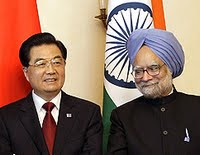There is no faster route to second-tier great power status than for an actual or aspiring superpower to fight a crippling conflict with another country from those same ranks. Moreover, if history is any guide, the glass ceiling that results is a permanent one: This was the fate of imperial Britain, imperial Japan and Germany -- both imperial and Nazi -- in the first half of the 20th century, and the same was true for Soviet Russia in the second half of the century, despite Moscow's conflict with the West being a cold one. The lesson is an important one for Washington, Beijing and New Delhi to keep in mind in the years ahead, given that the two most likely dyads for major war in the 21st century are America-China and China-India.
Many casual observers will dismiss such concerns as overwrought, even as India bulks up its military with China in mind and China does the same with an eye on America's battle-tested but weary force. If conflict is such a farfetched scenario, then the "CIA" trio -- China, India and America -- is spending a whole lot of money on strategic bluster and posturing at a time when the world at large deserves better from each individually and all collectively. Globalization is still rapidly expanding, unleashing all manner of local instabilities in developing regions that are not yet capable of absorbing its revolutionary embrace. China and India are globalization's lead integrating agents and America its clear policing lead, but actual cooperation among them on running this messy world could be charitably described as embryonic -- and more accurately cast as non-existent.
As for a grand vision in this regard, the Obama administration has offered nothing more than what we suffered through during the Clinton and Bush years: Washington still sees its only serious allies in Western Europe and industrialized Asia. But as NATO's Libyan intervention makes clear, the Western alliance has outlived its strategic coherence. Outside of America, the West isn't having enough babies, and as a result, both our European allies and Japan are now losing workers and stockpiling elders. Meanwhile, their militaries are shrinking, as is their will to fight. Looking ahead to the post-2030 strategic landscape, when the world will be experiencing all manner of resource and environmental stresses, Europe and Japan cannot be considered serious first-tier candidates for superpower status.

